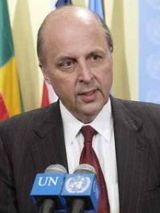Sudan likely to resist US pressure on Darfur
April 9, 2007 (KHARTOUM) — Sudan is unlikely to ease its opposition to the deployment of U.N. troops in Darfur this week when a top U.S. official visits, but there are signs it may be flexible on boosting African troops in the troubled region.

The AU operates an overstretched 7,000-strong force in Darfur, where violence has persisted despite a 2006 peace agreement between the government and one rebel faction. Unidentified gunmen killed five AU troops earlier this month.
Negroponte will also visit Chad and Libya, two other players in the Darfur conflict. It is not clear when he will arrive in Sudan on a regional tour.
South African President Thabo Mbeki, who is known for his diplomatic skills and is promoting his country as a mediator in African affairs, will arrive in Sudan on Tuesday and is expected to discuss the Darfur issue.
At the heart of the debate is the outcome of a November meeting in Addis Ababa. The United Nations says Khartoum agreed then to a three-phase plan that would end with a hybrid AU-U.N. operation in Darfur.
Sudan said it only agreed to the first two phases of U.N. logistical and financial support.
After a meeting with Sudanese President Omar Hassan al-Bashir on Saturday, African Union Chairman Alpha Oumar Konare backed Khartoum, saying that there had been a clear agreement in Addis Ababa that there would be a hybrid force consisting of an African force under AU command with logistical, financial and administrative assistance from the United Nations.
But he said the size of the African force had yet to be determined. The AU and United Nations were holding discussions on the issue on Monday in a technical meeting in Addis Ababa.
CHINESE ENVOY VISITS
Bashir, who says U.N. troops would amount to foreign occupation, has made a vague reference to “reviewing” issues related to Darfur.
U.S. officials have said they were close to imposing new measures against Sudan but an announcement appears to have been put on hold after U.N. Secretary General Ban Ki-moon said he wanted more time to convince Bashir to accept a hybrid force.
The measures contemplated include adding more firms to a U.S. sanctions list as well as further limits on Sudanese firms doing business in dollars and slapping travel and banking restrictions on at least three more Sudanese individuals.
The United States also aims to pressure Bashir militarily by helping rebuild the forces of the Sudan People’s Liberation Army which was at war with the north until a 2005 peace deal.
But Sudan, which has faced little pressure from the African Union and enjoys growing ties with China, has remained defiant.
State television gave prominence to a visit by the China’s special envoy Zhai Juan, who visited Darfur camps for the displaced and said international pressure would only hurt efforts to ease the suffering there.
Experts estimate that 200,000 people have been killed and 2.5 million fled their homes in Darfur since the conflict flared in 2003 when rebels took up arms against the central government. Khartoum says only 9,000 died.
Sudan accused European countries on Saturday of withholding support for African Union troops in Darfur to try to force the need for UN military intervention.
(Reuters)
